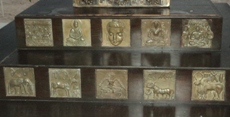Leaders of the religious conservative Adhaalath Party have claimed legislation passed by parliament last week requiring political parties to have a minimum of 10,000 registered members was a direct attempt to dissolve the party.
If the political parties bill passed on Thursday is signed into law, parties without 10,000 members would have three months to reach the legally required number or face being dissolved.
At a press conference on Saturday, Adhaalath Party Leader Sheikh Imran Abdulla said he suspected that “black money” from Indian infrastructure company GMR was behind the decision to insert the clause requiring 10,000 members.
Imran said the bill was intended to “eradicate” Islamic ideology from Maldivian politics and “defeat” the party’s efforts to oppose alleged attempts to secularise the country.
Imran claimed that “a person with a brain would not deny” that the decision by parliament’s Independent Institutions Committee to raise the prerequisite to 10,000 members from 5,000 at a late stage was made “because Adhaalath Party would be disqualified at that number.”
He further contended that the party’s recent campaigns to “reclaim the airport” from the GMR-led consortium and “reform parliament” was also “connected to passing that bill.”
“This is a big political and legal challenge [they] placed before Adhaalath Party. The way the political sphere in the country is shaped today, it is very important for a political party like Adhaalath Party to exist,” he said.
Imran also argued that the bill also violated the constitutional principle of equality.
Following preliminary debate in early 2010, the political parties bill was reviewed and finalised by the Independent Institutions Committee on December 10, 2012.
Writing in his personal blog (Dhivehi) in October, Independent Institutions Committee Chair MP Mohamed ‘Kutti’ Nasheed revealed that “a clear majority” voted in favour of requiring parties to gain 5000 members before it can be officially registered, and 10,000 members before becoming eligible for state funds.
“When the law is passed, the current registered parties with less than 5,000 members would be given a six month period to reach the figure. If a party fails to reach that figure by the end of the period, the particular party would be dissolved,” Nasheed explained.
However, the minimum number of members was later raised to 10,000 and the period shortened to three months before the draft legislation was presented to the Majlis floor for Thursday’s vote.
The political parties bill was passed with 64 votes in favour and four against.
According to figures from the Elections Commission (EC), Adhaalath Party has 5,881 as of December 27. In October 2011, the party had 6,140 members.
Only four parties out of 16 registered in the country have more than 10,000 members, including the formerly ruling Maldivian Democratic Party (MDP) and government-aligned Progressive Party of Maldives (PPM), Dhivehi Rayyithunge Party (DRP) and Jumhooree Party (JP).
Speaking at yesterday’s press conference, Islamic Minister Sheikh Mohamed Shaheem Ali Saeed, chief spokesperson of the party, dismissed the notion that the minimum requirement of 10,000 members was approved for economic reasons as political parties were provided funds from the state budget.
Shaheem criticised provisions in recently-passed legislation on MPs’ privileges guaranteeing retirement pensions after one term as well as overseas medical treatment for MPs’ family members as untenable expenses by the state.
“When a MP serves a five-year term, the state has to pay him till he goes to the grave. And [the state] has to take care of him and his family,” Shaheem said.
If state funding for small political parties was too costly, Shaheem argued that a monthly pay of more than MVR 12,000 for island councillors was excessive as well.
Five-member councils in islands with very small populations had “nothing at all to do,” he claimed.
Housing Minister Dr Mohamed Muiz meanwhile said that the membership clause was intended to get rid of the religious conservative party due to its efforts “on behalf of Islam” in recent years.
Muiz referred to the Adhaalath Party’s successful campaign against proposed regulations to authorise sale of alcohol in city hotels as well as its opposition to making Dhivehi and Islam non-compulsory subjects in higher secondary education. He claimed that the party also put a stop to former President Mohamed Nasheed’s attempts to strengthen ties with Israel and “bring Jews” to allow them to “exert influence in the country”.
Muiz, who also serves as the Adhaalath Party’s secretary general, called on “all citizens who love Islam” to sign up for the party.
Sheikh Ilyas Hussain, head of the party’s religious scholars council, meanwhile claimed that efforts to get rid of Adhaalath Party were intended to “erase” Islam from the Maldives and “spread secular activities in society.”
Following the parliament’s vote on the political parties bill, Adhaalath Party Sheikh Mohamed Iyash wrote on the party’s website last week that it was “essential for religious people to have political power given the state of the Maldives.”
“Religion and politics cannot be separated. Calls by some secular individuals to separate religion and politics are dangerous,” he wrote in response to a purported question regarding the “Shariah judgment” on signing for Adhaalath Party.
“Their [secular individuals’] intention is for religious scholars to not criticise any affairs of state and just stay in mosques praying and giving religious advice,” he wrote, adding that it was compulsory upon all Muslims to “enjoin good and forbid evil.”
A “religious political party” in the Maldives was therefore “necessary and obligatory,” he contended.
“Adhaalath Party is the only party formed to protect religion in the country. To say that all other political parties were formed for worldly purposes would not be demeaning them,” he added.
Sheikh Iyash wrote that it was “a big responsibility of every Maldivian citizen to find a way to maintain Adhaalath Party in existence.”
The Adhaalath Party has announced that it would hold a rally on Thursday night to launch a recruitment drive to increase membership.


